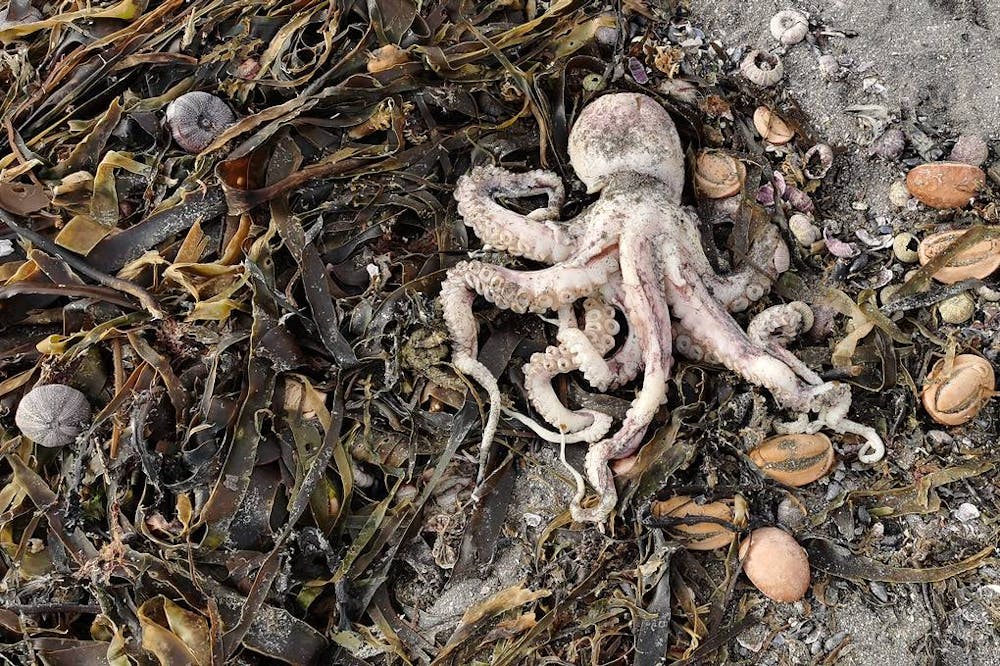Undergraduate students at Duke Kunshan University in China are contributing written and multimedia content to The Chronicle, usually published every other Friday.
In the news media we read about the economy, politics, and, nowadays, a lot about COVID-19. On social media, we talk about protesting, voting and supporting one another. What we are not discussing enough is environmental issues. Why is it not just as important to breathe fresh air or to drink clean water?
At the end of September, at the Kamchatka Peninsula in Eastern Russia, thousands of sea creatures were found dead, the ocean surface was covered in yellowish foam and the water was opaque. Surfers suffered too. Some of them almost lost their eyesight after spending time in the water. If we try to do our own little investigation about what actually happened there, we will not be able to find an answer, because no one knows exactly what happened. We can only read the reports from divers saying that “at depths from 10 to 15 meters…95 percent of the sea life is dead. Some large fish, shrimps, crabs have survived, but in very small quantities.”
Of course, there are different theories as to what happened. One theory holds that it was rocket oil, or there was a leak at an abandoned chemical plant near the shore; others claim that it was due to the excessively warm autumn causing the seaweed to start to bloom.
Two months after the crisis, the government and the scientific community blame a violent algae bloom that led to a sharp decrease in oxygen dissolved in the water, with a lack of oxygen that causing the death of sea creatures. Environmental activist group Greenpeace thinks that it is more than that: wastewater discharge, leakage of toxic chemicals and pesticides from a landfill. The WWF is unable to draw any conclusions due to the lack of official data.
All of these theories indicate that we did something wrong: global warming and climate change, oil usage, or careless behavior. And don't forget that disaster threatens World Heritage Sites—South Kamchatka Natural Park and the South Kamchatka Federal Reserve—because the issue was not resolved.
I have struggled to decide on what the worst part of all of this is. Is it that 95% of marine creatures are dead, is it the lack of governmental transparency and action towards this environmental disaster, or is it the apathy of most people on this issue?
However, if I am going to be honest, we cannot blame people: There is little public recognition of climate change in Russia. Climate strikes look more like single pickets due to Russian regulations. Generally, people do not know the term sustainability, and those who care about the environment are weirdos. So I am going to call myself a weirdo, and I'm not going to be ashamed of it. This is the reality.
The idea in all of this is that the Kamchatka disaster serves as an example not only for Russians but for all of us as global citizens. We need to shift our priorities right now. We need to stop playing politics and trying to prove each other wrong, and actually start helping one another, especially when it comes to the environment. We might all have different political agendas, but the Earth is something we all have in common.
It’s the Decade of Action, and joining forces and learning from each other is the key to stop disasters from happening.
Start taking action today. Become a Green Devil. Take a sustainability pledge. Get a Green Room Certificate. If you are a DKU student, join SustainableDKU, help us develop a DKU climate action plan, work with us to educate locals about sustainability. There are so many things you can start doing that are going to create a positive change in our society and get us one step closer to a cleaner and more sustainable environment.
Yana Kachenyuk is a first-year in the third-ever graduating class of the Duke Kunshan campus’s undergraduate program, located outside Shanghai.
Get The Chronicle straight to your inbox
Sign up for our weekly newsletter. Cancel at any time.

